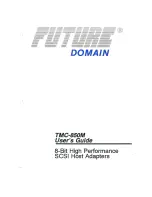
While direct assignment of a PCIe device or an SR-IOV Virtual Function (VF) to a Linux-based VM running 2.6.32 or
later kernel works fine, there is a known issue with Microsoft Windows Server 2008/R2 VM that results in a "yellow
bang" error. This problem is within the KVM VMM itself, not the Intel driver, or the SR-IOV logic of the VMM, but rather
that KVM emulates an older CPU model for the guests, and this older CPU model does not support MSI-X interrupts,
which is a requirement for Intel SR-IOV.
If you wish to use the Intel X540 or 82599-based controllers in SR-IOV mode with KVM and a Microsoft Windows
Server 2008/R2 guest try the following workaround. The workaround is to tell KVM to emulate a different model of CPU
when using qemu to create the KVM guest:
"-cpu qemu64,model=13"
Unable to Obtain DHCP Lease on Boot with RedHat
For configurations where the auto-negotiation process takes more than 5 seconds, the boot script may fail with the fol-
lowing message:
"ethX: failed. No link present. Check cable?"
If this error appears even though the presence of a link can be confirmed using
ethtool ethX
, set
LINKDELAY=15
in
/etc/sysconfig/network-scripts/ifcfg-ethX.
NOTE:
Link time can take up to 30 seconds. Adjust the LINKDELAY value accordingly.
Alternatively NetworkManager can be used to configure the interfaces, which avoids the set timeout. For configuration
instructions of NetworkManager refer to the documentation provided by your distribution.
Loading ixgbe Driver in 3.2.x and Above Kernels Displays Kernel Tainted Message
Due to recent kernel changes, loading an out of tree driver will cause the kernel to be tainted.
Host may Reboot after Removing PF when VF is Active in Guest
If you are using kernel versions earlier than 3.2, do not unload the PF driver with active VFs. Doing this will cause your
VFs to stop working until you reload the PF driver and may cause a spontaneous reboot of your system.
Software Bridging Does Not Work with SR-IOV Virtual Functions
SR-IOV Virtual Functions are unable to send or receive traffic between VMs using emulated connections on a Linux
Software bridge and connections that use SR-IOV VFs.
Unloading Physical Function (PF) Driver Causes System Reboots when VM is Run-
ning and VF is Loaded on the VM
On pre-3.2 Linux kernels unloading the Physical Function (PF) driver causes system reboots when the VM is running
and VF is loaded on the VM.
Do not unload the PF driver (ixgbe) while VFs are assigned to guests.
ixgbevf Linux* Driver for the Intel® 10 Gigabit Server Adapters
SR-IOV Overview
Single Root IO Virtualization (SR-IOV) is a PCI SIG specification allowing PCI Express devices to appear as multiple
separate physical PCI Express devices. SR-IOV allows efficient sharing of PCI devices among Virtual Machines (VMs).
It manages and transports data without the use of a hypervisor by providing independent memory space, interrupts,
and DMA streams for each virtual machine.
















































